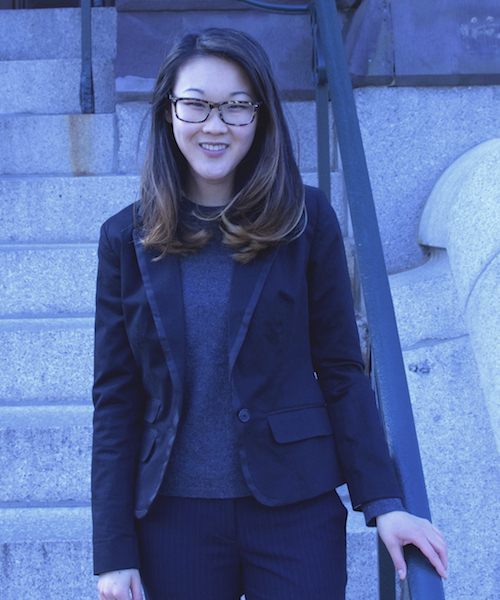
The Behind-the-Scenes Conversations
Andrea Su | 2019年8月30日
注:中英文网站上发表的学生日志均为英文。
The world needs more programs like the Initiative for U.S.-China Dialogue on Global Issues. Not because we need more round-tables, think pieces, or debates; we need more dialogue because we need more empathy. This topic is tough to write about because empathy is just how you feel about others. You can’t “teach” somebody to think differently about others like you can teach them about politics or economics. But it is exactly the lack of empathy that is causing discussions about these more “objective” issues to fall apart. Government leaders need more cross-cultural empathy, globalists need more empathy for the less well off, and the Chinese and American people broadly need more empathy for folks beyond their borders.
In her final blog last year, ‘17-‘18 Fellow Yunxin Wang wrote that the program “encouraged us to clash our values, change our standpoints, and try to find a common ground between seemingly antithetical ideas by untangling our underlying assumptions and matching our commonalities, no matter how small they initially seem.” I saw that theme of encouraging common understanding in a number of Fellows’ reflections. Empathy is important to the types who participate in the Initiative for U.S.-China Dialogue on Global Issues—whether we’re negotiating bilateral agreements, developing products for new markets, or accurately reporting on international developments. Understanding the why behind the what is key to creating workable solutions, but not enough global leaders have the empathy to understand an issue from another’s perspective. This is particularly true for the American government, and it is not just an issue for the current administration. As George Packer points out in his book Our Man: “That’s always been the weak spot of our Foreign Service—other countries. It’s hard to get Americans interested in them, and the more interested you get, the worse your career prospects.”
And it isn’t necessarily hard because people are malicious, close-minded, or ignorant. It’s just tough to make new friends who aren’t like you! During my semester with the U.S. Consulate in Shanghai, my expat friends went to the same expat bars, ate at the same expat restaurants, and chatted in the same expat WeChat groups that all the other expats did. The worst offenders were a group that I’d met whose major at university required them to spend at least two semesters abroad—in London and Shanghai—to cultivate a global understanding appropriate for students aiming to be future leaders in business and government. While some made an effort to really be in Shanghai, most did everything they could to feel that they were still in America. I was surprised that they had even less exposure to China than I did as an intern with the U.S. government. What the U.S.-China Student Fellows program does so well is force friendship between Chinese and American students. Casual conversations in long van rides from one end of Beijing to another, late nights over hotpot, and exchanging favorite songs in the hotel were the moments I found most valuable. I found this was the best way to accomplish ‘16-‘17 Fellow Richard Chang’s goal of cross-cultural understanding.
The concept of empathy, however, extends beyond culture in an age of globalization. In Winners Take All, Anand Giridharadas accuses “the kind of people who say they ‘live between’ two places”—globalists—of not understanding or empathizing with those who would push back against borderlessness, limitless free trade, and rapid automation. Indeed, there are often more cross-cultural similarities amongst global elites (of which the U.S.-China Student Fellows are a part) than there are between them and the disadvantaged in their own societies. So at the same time as we pursue cross-cultural empathy to bridge the gap in a vital bilateral relationship, we also have to empathetically understand the domestic situations of our respective countries. China’s anxiety about slowing growth and an aging populace and America’s rising inequality are some of the base drivers for the current trade dispute, and the domestic economic health of both countries will continue to define the relationship. It is a lack of empathy for American workers—“they’ll be retrained at some point, free trade is just a temporary disruption in the workforce”—that led to resentment. And that is a blind spot of exchange programs like these. While programs that collect future leaders do promote understanding between those leaders, they do less to put a human face to the numbers to help us understand the impact of those policies that we’ll be pursuing.
However, those disadvantaged by globalization and trade with China are not blameless either for their lack of empathy towards those in other countries that their pushing for a trade war will impact. Promoting that empathy, however, a sort of nationwide general empathy for your fellow human, is more difficult. It’s one thing to put thousands of dollars behind a group of a dozen American and Chinese students to encourage their (important and consequential) friendship, it’s quite another to replicate that on a population of over a billion. Hillary Clinton failed to win the American election on essentially a vision of racial, gender, and class unity and empathy, and she failed particularly amongst those who were disadvantaged by that ethos of global understanding.
So how do we reach them? As ’17-’18 Fellow Cynthia Wang pointed out in a post, media has become a shared global language. If there is one way to bridge a divide, I believe in the power of social and entertainment media platforms to showcase the humanity of those around the world. I believe that power exists, but I’m less sure that it will be used for such good. While Facebook and Twitter are essentially the regulators of the modern public square, there has been little regulation of them as private corporations. Countless commentators have observed that these platforms contribute to political radicalization and division, but both the U.S. and Chinese governments have lagged these criticisms (the Communist Party only regulates media insofar as it serves their interests and their narrow view of what is acceptable in society). Both ought to do more.
This blog articulates an expansive version of empathy. Developing it may seem like an overly optimistic fight against a by default suspicious and self-protective human nature, but it is a fight that, if won, makes every global issue easier to solve.

Andrea Su | 2019年8月30日

Junming Cui | 2019年8月30日

Yihong Shi | 2019年8月30日

Zhaoqing Li | 2019年8月30日

Isabelle Hupez | 2019年8月29日

Ivan Solomon | 2019年8月29日

Jozanne Murphy | 2019年8月29日

Xiaogu Xu | 2019年8月29日

Chang Fan | 2019年8月28日

Danny Li | 2019年8月28日

Lakshmi Iyengar | 2019年8月28日